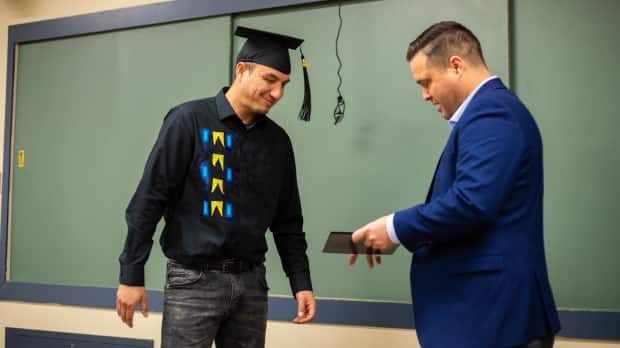New graduate wants to draw on sports, tradition to help kids in Sioux Valley Dakota Nation

A southwestern Manitoba First Nation man who graduated this week from a program focused on mental wellness says he hopes to meld Indigenous and Western perspectives to help youth in his community — something a band councillor says will be essential in helping shape the future of Sioux Valley Dakota Nation.
New grad Thomas Rosmus, a Sioux Valley Dakota Nation member, plans to combine his education with his passion for sports and traditional teachings to support youth in his community.
"I think our youth is our future, so I would like to help any way I could," Rosmus said. "I'm traditional myself, but the sports way ... I'm that guy [too].
"That's a good path … I think, for myself to help [young people]."
Rosmus, who now has a diploma in mental wellness and harm reduction, was part of a class that graduated Thursday from LINKS — or Linking Integrated Networks of Knowledge Systems — a private vocational institute in Brandon that offers online programs focused on health, social and community services.
Rosmus is already working in Brandon as a support worker with Sioux Valley's Dakota Tiwahe Services — a child and family services agency that works with Sioux Valley members on and off reserve.

Dakota Tiwahe Services executive director Carol McKay-Whitecloud says having Sioux Valley members like Rosmus working with others from the community is critical, because they can relate to clients' experiences and culture while also drawing on their post-secondary education.
"The value system, that code of people's lives, is unique to Dakota people," McKay-Whitecloud said. "I think it's effective to have Dakota people providing the services."
Melding Indigenous and Western ways of healing
Dakota Tiwahe Services focuses on both Indigenous and Western approaches to healing. McKay-Whitecloud says the goal is to provide wrap-around services that can include psychiatrists, clinicians and other specialists paired with Dakota teachings and traditions.
The most important part of Dakota Tiwahe's approach is having compassion and being a good relative to the people the agency supports, McKay-Whitecloud said.
Sioux Valley Coun. Tony Tacan says he wants to support people working in mental wellness and harm reduction, because they are helping shape the future of the Dakota nation.

"The struggles they're going to see in the people and the mental health issues … [are] results of the meth crisis, COVID, loneliness, grief, loss — grief is a big part of it now," Tacan said.
"The work is going to be extensive to try and get everybody back on track into mental health and wellness."
In many cases, he says, that requires a balance between Indigenous and Western perspectives, he said.
Honouring traditional Dakota ways and using the teachings of elders can lead to big success for Sioux Valley children and young adults, said Tacan.
Luana Hebert, who graduated from LINKS with Rosmus on Thursday, moved to Manitoba from Brazil 20 years ago.
She said she experienced some culture shock because she thought Canada would take better care of all people — especially when it comes to compassionate support and programming.

She says learning about Indigenous health has helped her better understand policies and care systems in Manitoba — and the impact they can have on communities.
"It helps us see how things are and how they could be improved and try to find equity," Hebert said.
"It opened my eyes to an inequality that I didn't understand.… I feel like being able to have that compassion regardless of what is going on, it gives me the strength."
Hope for the future
Tacan sees a lot of hope in the young people committed to helping their communities.
"It's encouraging to see ... because they do have a big job ahead of them and people need to encourage them," Tacan said. "Going forward, let's hope … that we get more people counselled and on the road to healing."
Rosmus says sports helped him in his life, so he wants to use that avenue to help his community. He also has plans to connect with and help community members through Dakota teachings, including a traditional men's group and sweats.
"I want to bring that … [to] our youth and get them all to get them having fun, get them connected with sports and recreation," Rosmus said. "I think it's all positive."

 Yahoo Sports
Yahoo Sports 
